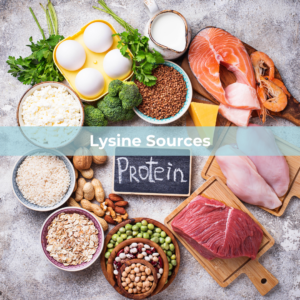Lysine is an amino acid vital for overall health and well-being due to its diverse roles in protein synthesis, collagen formation, calcium absorption, immune function, and more.
Adequate lysine intake supports muscle health, bone integrity, skin elasticity, immune defense, and efficient energy metabolism.
Benefits of Lysine
- Protein Synthesis: Lysine is vital for the production of proteins, which are necessary for growth, tissue repair, and the synthesis of enzymes and hormones.
- Calcium Absorption: It helps in the absorption of calcium, thus promoting bone health.
- Collagen Formation: Lysine is essential for the formation of collagen, a protein that is critical for healthy skin, cartilage, and connective tissues.
- Immune Function: It supports the immune system by aiding in the production of antibodies.
- Enzyme and Hormone Production: Lysine is involved in the production of various enzymes and hormones.
- Wound Healing: It plays a role in wound healing due to its involvement in collagen formation.

How does Lysine affect the body
- Protein Synthesis – Lysine is a building block of proteins, essential for the growth, repair, and maintenance of body tissues. It helps synthesize proteins needed for muscles, skin, enzymes, and hormones.
- Collagen Formation – Lysine plays a crucial role in the formation of collagen, a structural protein that helps maintain the integrity of skin, cartilage, tendons, and bones. Collagen is essential for wound healing and maintaining healthy skin.
- Calcium Absorption – Lysine enhances the absorption and retention of calcium, thereby supporting bone health and helping to prevent osteoporosis. It also aids in the formation of collagen, which is important for bone structure.
- Immune System Support – Lysine is involved in the production of antibodies, which are critical for immune function. It helps the body fight off infections and diseases.
- Hormone Production – Lysine is necessary for the synthesis of various hormones and enzymes that regulate metabolism and other bodily functions.
- Wound Healing – Lysine contributes to the repair of tissues and is crucial for wound healing. It helps the body produce collagen, which is necessary for repairing damaged tissues and maintaining skin health.
- Energy Production – Lysine is involved in the conversion of fatty acids into energy, supporting overall energy metabolism and helping to maintain energy levels.
- Herpes Simplex Virus (HSV) – Lysine has been studied for its potential to reduce the frequency and severity of outbreaks caused by the herpes simplex virus (HSV). It is believed to inhibit the replication of the virus by competing with another amino acid, arginine, which HSV needs to replicate.
- Anxiety and Stress Reduction – Some studies suggest that lysine may help reduce anxiety and stress by modulating the release of stress hormones and neurotransmitters. It might have a calming effect on the nervous system.
- Nitrogen Balance – Lysine helps maintain a positive nitrogen balance, which is essential for muscle growth and repair, particularly in athletes and those undergoing intensive physical training.
Symptoms of Lysine Deficiency

Lysine deficiency is relatively rare but can occur, particularly in people who follow a diet low in protein. Symptoms of lysine deficiency may include:
- Fatigue – Feeling unusually tired or weak.
- Poor Concentration – Difficulty focusing or concentrating.
- Irritability – Increased irritability or mood swings.
- Hair Loss – Thinning or loss of hair.
- Anemia – Symptoms of anemia such as pale skin, weakness, and dizziness.
- Reproductive Disorders – Issues related to reproductive health.
- Slow Growth – In children, lysine deficiency can lead to stunted growth.
Symptoms of Excess Lysine
While lysine toxicity is rare because excess lysine is typically excreted by the kidneys, consuming very high amounts from supplements may cause some side effects:
- Stomach Pain – Abdominal discomfort or pain.
- Diarrhea – Gastrointestinal disturbances, including diarrhea.
- Kidney Issues – Excessive lysine intake may put stress on the kidneys.
- Gallstones – High lysine intake might contribute to the formation of gallstones.
Sources of Lysine

Lysine is an essential amino acid, meaning that the body cannot synthesize it and it must be obtained from the diet. Lysine is found in a variety of foods, particularly high-protein foods. Some good dietary sources include:
- Meat – Beef, pork, and lamb.
- Poultry – Chicken and turkey.
- Fish – Salmon, tuna, and other fish.
- Dairy Products – Milk, cheese, and yogurt.
- Eggs – Both the whites and yolks.
- Legumes – Lentils, chickpeas, and beans.
- Soy Products – Tofu, tempeh, and soy milk.
- Nuts and Seeds – Pumpkin seeds, pistachios, and other nuts.
- Quinoa – A grain that is a good source of lysine.
Lysine is essential for multiple bodily functions, including protein synthesis, collagen formation, calcium absorption, immune function, hormone and enzyme production, wound healing, energy metabolism, and antiviral defense. A deficiency in lysine can lead to various health issues, while adequate intake supports overall health and well-being. Ensuring sufficient lysine intake through diet or supplements is crucial for maintaining optimal health.
Find out about all the supplements available to you at our Intramuscular Vitamins page. Contact us to get help choosing the right supplement for you or book your shot today.